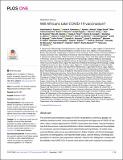Files in this item
Will Africans take COVID-19 vaccination?
Item metadata
| dc.contributor.author | Anjorin, AbdulAzeez A | |
| dc.contributor.author | Odetokun, Ismail A | |
| dc.contributor.author | Abioye, Ajibola I | |
| dc.contributor.author | Elnadi, Hager | |
| dc.contributor.author | Umoren, Mfon Valencia | |
| dc.contributor.author | Damaris, Bamu F | |
| dc.contributor.author | Eyedo, Joseph | |
| dc.contributor.author | Umar, Haruna I | |
| dc.contributor.author | Nyandwi, Jean B | |
| dc.contributor.author | Abdalla, Mena M | |
| dc.contributor.author | Tijani, Sodiq O | |
| dc.contributor.author | Awiagah, Kwame S | |
| dc.contributor.author | Idowu, Gbolahan A | |
| dc.contributor.author | Fabrice, Sifeuh N Achille | |
| dc.contributor.author | Maisara, Aala M O | |
| dc.contributor.author | Razouqi, Youssef | |
| dc.contributor.author | Mhgoob, Zuhal E | |
| dc.contributor.author | Parker, Salim | |
| dc.contributor.author | Asowata, Osaretin E | |
| dc.contributor.author | Adesanya, Ismail O | |
| dc.contributor.author | Obara, Maureen A | |
| dc.contributor.author | Jaumdally, Shameem | |
| dc.contributor.author | Kitema, Gatera F | |
| dc.contributor.author | Okuneye, Taofik A | |
| dc.contributor.author | Mbanzulu, Kennedy M | |
| dc.contributor.author | Daitoni, Hajj | |
| dc.contributor.author | Hallie, Ezekiel F | |
| dc.contributor.author | Mosbah, Rasha | |
| dc.contributor.author | Fasina, Folorunso O | |
| dc.date.accessioned | 2021-12-06T16:30:09Z | |
| dc.date.available | 2021-12-06T16:30:09Z | |
| dc.date.issued | 2021-12-01 | |
| dc.identifier | 276989194 | |
| dc.identifier | e7f64ff4-2235-4b59-a970-d6663b8fb9b7 | |
| dc.identifier | 34851998 | |
| dc.identifier | 85120435869 | |
| dc.identifier | 000755762900047 | |
| dc.identifier.citation | Anjorin , A A , Odetokun , I A , Abioye , A I , Elnadi , H , Umoren , M V , Damaris , B F , Eyedo , J , Umar , H I , Nyandwi , J B , Abdalla , M M , Tijani , S O , Awiagah , K S , Idowu , G A , Fabrice , S N A , Maisara , A M O , Razouqi , Y , Mhgoob , Z E , Parker , S , Asowata , O E , Adesanya , I O , Obara , M A , Jaumdally , S , Kitema , G F , Okuneye , T A , Mbanzulu , K M , Daitoni , H , Hallie , E F , Mosbah , R & Fasina , F O 2021 , ' Will Africans take COVID-19 vaccination? ' , PLoS ONE , vol. 16 , no. 12 , e0260575 . https://doi.org/10.1371/journal.pone.0260575 | en |
| dc.identifier.issn | 1932-6203 | |
| dc.identifier.other | ORCID: /0000-0002-1623-9302/work/104619487 | |
| dc.identifier.uri | https://hdl.handle.net/10023/24480 | |
| dc.description.abstract | The economic and humanistic impact of COVID-19 pandemic is enormous globally. No definitive treatment exists, hence accelerated development and approval of COVID-19 vaccines, offers a unique opportunity for COVID-19 prevention and control. Vaccine hesitancy may limit the success of vaccine distribution in Africa, therefore we assessed the potentials for coronavirus vaccine hesitancy and its determinants among Africans. An online cross-sectional African-wide survey was administered in Arabic, English, and French languages. Questions on demographics, self-reported health status, vaccine literacy, knowledge and perception on vaccines, past experience, behavior, infection risk, willingness to receive and affordability of the SARS-COV-2 vaccine were asked. Data were subjected to descriptive and inferential statistics. A total of 5,416 individuals completed the survey. Approximately, 94% were residents of 34 African countries while the other Africans live in the Diaspora. Only 63% of all participants surveyed were willing to receive the COVID-19 vaccination as soon as possible and 79% were worried about its side effects. Thirty-nine percent expressed concerns of vaccine-associated infection. The odds of vaccine hesitancy was 0.28 (95% CI: 0.22, 0.30) among those who believed their risk of infection was very high, compared to those who believed otherwise. The odds of vaccine hesitancy was one-fifth (OR = 0.21, 95% CI: 0.16, 0.28) among those who believed their risk of falling sick was very high, compared to those who believed their risk of falling very sick was very low. The OR of vaccine hesitancy was 2.72 (95% CI: 2.24, 3.31) among those who have previously refused a vaccine for themselves or their child compared to counterparts with no self-reported history of vaccine hesitancy. Participants want the vaccines to be mandatory (40%), provided free of charge (78%) and distributed in homes and offices (44%). COVID-19 vaccine hesitancy is substantial among Africans based on perceived risk of coronavirus infection and past experiences. | |
| dc.format.extent | 15 | |
| dc.format.extent | 767444 | |
| dc.language.iso | eng | |
| dc.relation.ispartof | PLoS ONE | en |
| dc.subject | QR355 Virology | en |
| dc.subject | RA0421 Public health. Hygiene. Preventive Medicine | en |
| dc.subject | 3rd-DAS | en |
| dc.subject | SDG 3 - Good Health and Well-being | en |
| dc.subject | NIS | en |
| dc.subject.lcc | QR355 | en |
| dc.subject.lcc | RA0421 | en |
| dc.title | Will Africans take COVID-19 vaccination? | en |
| dc.type | Journal article | en |
| dc.contributor.institution | University of St Andrews. School of Medicine | en |
| dc.contributor.institution | University of St Andrews. Infection and Global Health Division | en |
| dc.identifier.doi | 10.1371/journal.pone.0260575 | |
| dc.description.status | Peer reviewed | en |
This item appears in the following Collection(s)
Items in the St Andrews Research Repository are protected by copyright, with all rights reserved, unless otherwise indicated.

